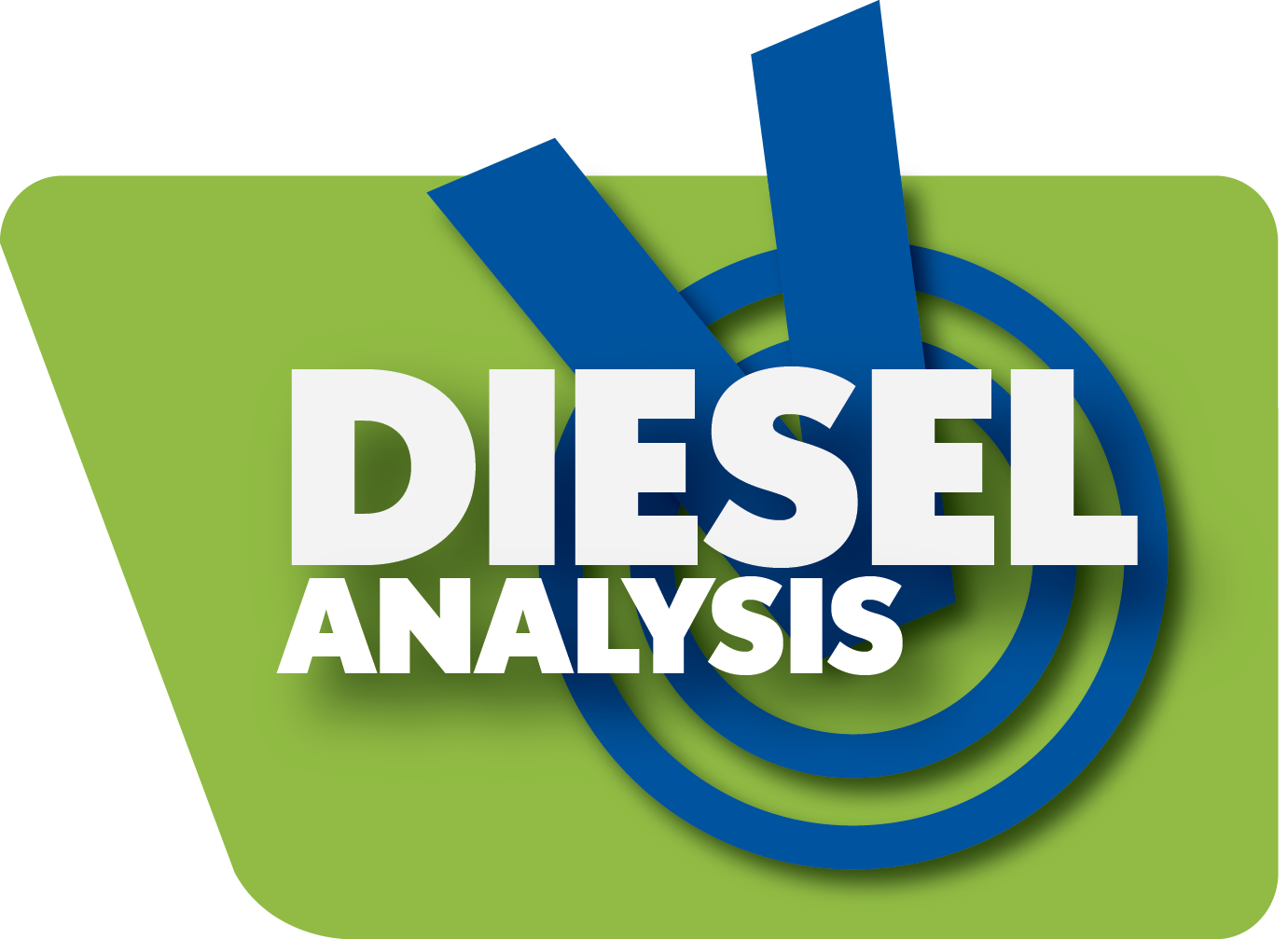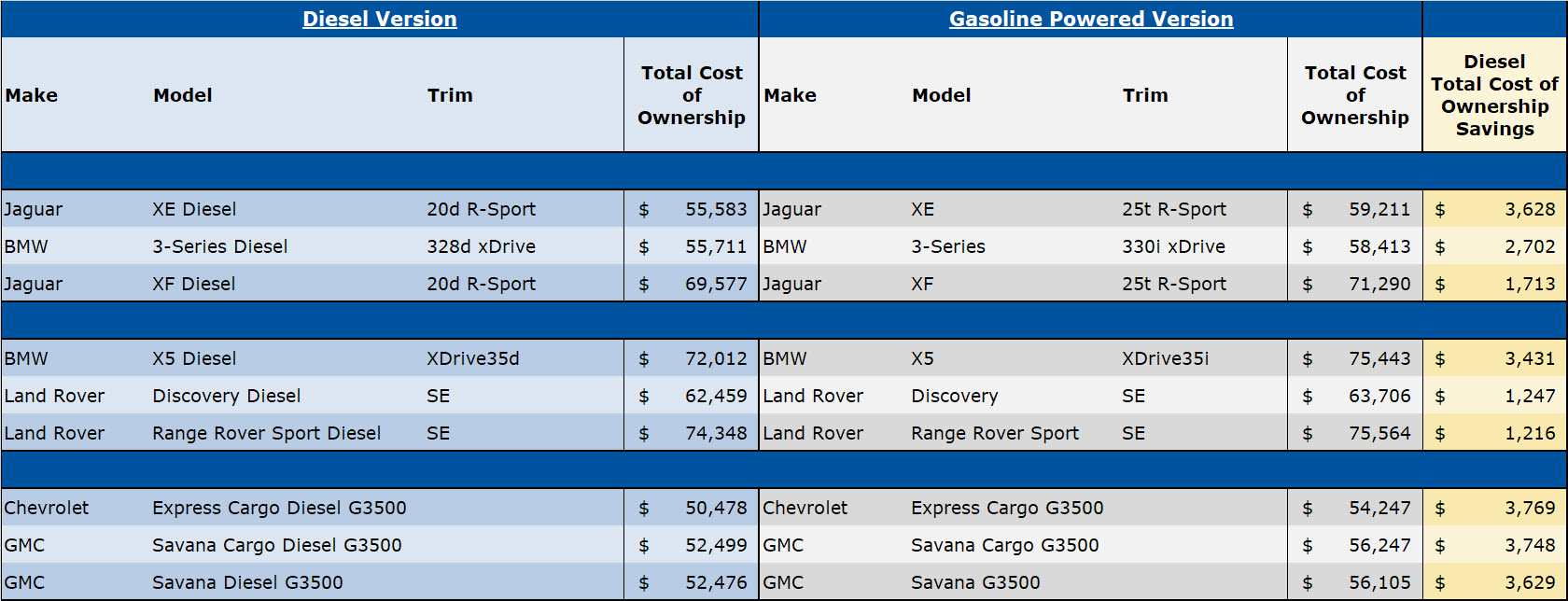EXECUTIVE SUMMARY

The Vincentric U.S. Diesel Analysis provides consumers and the automotive industry with information regarding the cost of owning a diesel vehicle compared to its closest gasoline powered counterpart. This year, results demonstrated that 77 of the total 419 (18%) diesel vehicles analyzed offered a lower total cost of ownership than their closest gasoline powered equivalent.
The 419 available diesel vehicles were categorized into four types: Passenger Cars (23 diesels), SUV/Crossovers (22 diesels), Trucks (324 diesels), and Vans (50 diesels). While virtually all diesel vans were cost-effective, none of the diesel trucks could make that claim. Passenger car and SUV/Crossover results were not as clear-cut, showing a need to look to the vehicle level to determine whether or not the diesel model was cost-effective.
The average price premium for a diesel vehicle was $7,130 more than the gasoline powered counterpart, which is a $724 increase from the previous study released in 2016. When Vincentric examined all costs associated with owning and operating a diesel, the average cost of ownership was $2,130 more than the gasoline powered equivalent.
COST OF OWNERSHIP COMPARISON
The Vincentric U.S. Diesel Analysis demonstrates that in addition to improved environmental benefits of diesels, a strong financial case can be made for the purchase of these 77 cost-effective vehicles. The top three diesel vehicles from each category with the greatest cost of ownership savings compared to its closest gasoline powered equivalent is listed below:

Note: Trucks are not included in the above chart because none of the trucks analyzed had cost of ownership savings when compared to its gasoline powered counterpart.
The results showed that buyers of diesel vans, which are primarily commercial vehicles, have a strong case for buying a diesel, given that 49 of the 50 (98%) vans analyzed showed the diesel as being cost-effective. In contrast, none of the 324 diesel trucks analyzed had a lower cost of ownership than their gasoline powered counterpart.
Much of this difference can be attributed to the fact that the average diesel van has only a $3,700 price premium vs. a similar gasoline powered van, while the price of a diesel truck averages $8,300 more than its gasoline powered counterpart. Another factor that is making diesel trucks not cost effective is that the maintenance cost of diesel trucks is on average $1,700 more than the gasoline counterparts while the average van maintenance is only about $540 more than a similar gasoline powered van.
The results for passenger cars and SUVS/Crossovers were more balanced, although most diesel passenger cars were cost-effective with 19 of 23 (83%) diesel passenger cars having lower cost of ownership than their gasoline counterparts. Diesel SUV/Crossovers did not have as strong of a case, with only 9 of 22 (41%) showing cost-effective results.
 Full analysis results with further detail regarding the cost of ownership for each diesel and its gasoline powered counterpart are available upon request. Please contact customer.service@vincentric.com to discuss receiving and licensing the complete analysis results.
Full analysis results with further detail regarding the cost of ownership for each diesel and its gasoline powered counterpart are available upon request. Please contact customer.service@vincentric.com to discuss receiving and licensing the complete analysis results.
ABOUT THE U.S. DIESEL ANALYSIS
The Vincentric data team prepared this report to help users understand the financial dynamics, including cost of ownership and fuel savings, of diesel vehicles compared to their closest gasoline powered counterparts. In addition to fuel costs, cost of ownership included seven other cost factors: depreciation, fees & taxes, financing, insurance, maintenance, opportunity cost, and repairs.
Fuel prices used in these reports are based on a weighted average over the previous five months, rather than the exact prices you might see at a gas station today. This is done to ensure that the analysis reflects current market trends and not market extremes.
The report assumes the vehicle is owned for five years with 15,000 miles driven annually. The numbers shown are U.S. averages, however, the same analysis can be done for any state or the District of Columbia.
WHY DO OWNERSHIP COSTS DIFFER BETWEEN DIESELS AND THEIR GASOLINE POWERED COUNTERPARTS?
In most cases studied, the diesel vehicle had a higher market price than its gasoline powered alternative, which causes several cost factors to increase including depreciation, finance, opportunity costs, and fees & taxes. Diesels are also becoming less cost-effective as they lose their competitive edge due to the improved fuel economy of gasoline-powered combustion engines and falling fuel prices. Ultimately, it’s important for consumers to look at their needs and the specific models available because depending on the negotiated price, driving patterns, and intended length of ownership, a diesel vehicle can still be a great value.
|

If you are interested in learning more about other Industry Reports from Vincentric,
click here
|